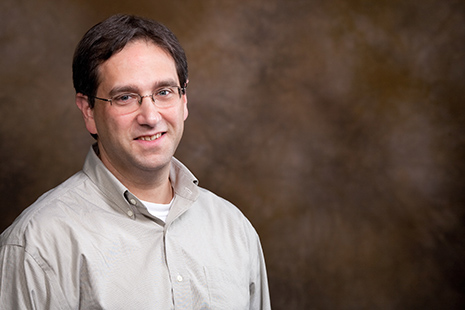FAYETTEVILLE, Ark. – University of Arkansas art historian Leo Mazow has received the 2013 Charles C. Eldredge Prize for Distinguished Scholarship in American Art for his book Thomas Hart Benton and the American Sound. The prize is awarded each year by the Smithsonian American Art Museum “to honor those authors who deepen or focus debates in the field, or who broaden the discipline by reaching beyond traditional boundaries.” The honor includes a $3,000 prize.
“The Eldredge Prize is the most prestigious award in American art history scholarship and one of several awards Leo has won since joining our faculty in 2010,” said Jeannie Hulen, chair of the art department at the University of Arkansas. “It is exciting to have such an outstanding scholar of American art as a colleague and researcher in our department.”
“Leo Mazow’s book offers a new model for examining artworks that combines formal, archival and social analysis with fascinating results,” said Elizabeth Broun, the Margaret and Terry Stent Director of the Smithsonian American Art Museum.
 Thomas Hart Benton and the American Sound by Leo G. Mazow |
“Mazow’s Thomas Hart Benton and the American Sound reverberates with potent ideas about the relationship between the history of visual art and sound,” the jurors wrote. “By contextualizing Benton’s paintings within a sonic environment — a world of radio, recordings, the whistles of trains and the scream of machinery — Mazow illuminates our understanding of the artist’s formal designs and rhythms and expands the manner in which we perceive his vernacular subjects. Delightfully written in language that sings and shouts along with its themes, Mazow’s book offers an entirely new way of relating Benton’s work to the sounds of his time.”
Benton is perhaps best known for his Regionalist paintings and his murals produced for such sites as the Missouri State Capitol and the Whitney Museum of New York. “However, Benton’s art reveals a deep engagement with senses other than vision, particularly that of sound. Aurality, voice, musical instruments, and the sounds of machines and recording devices are referenced throughout his work,” Mazow said.
Hailing from Neosho, Mo., and widely known as the teacher of Jackson Pollock, Benton came from a long line of politicians, and Mazow's book demonstrates that the artist had similar populist goals, preserving in paint the voice — and sounds — of the folk.
Benton was a self-taught and frequently performing musician who invented a harmonica entablature notation system used in music tutorials to the present day. Mazow found he was also a collector, cataloguer, transcriber and distributor of popular music. Mazow’s book, however, shows that musical imagery was part of a larger belief in the capacity of sound to register and convey meaning.
“In Benton's pictorial universe, it is through the form and subject matter of sound that stories are told, opinions are voiced, experiences are preserved, and history is recorded,” Mazow writes in his book. “All that is consequential, or so the artist would have us believe, has both voiced and heard components.”
The Eldredge Prize is named in honor of a former director of the Smithsonian American Art Museum. According to the museum, the prize “seeks to recognize originality and thoroughness of research, excellence of writing, clarity of method, and significance for professional or public audiences.”
Mazow will present the annual Eldredge Prize lecture at the Smithsonian American Art Museum in Washington, D.C., on Sept. 26.
Mazow is associate professor of art history in the J. William Fulbright College of Arts and Sciences at the University of Arkansas. Thomas Hart Benton and the American Sound was published by the Pennsylvania State University Press. His work on this publication was supported by a grant from the Wyeth Foundation for American Art, administered by the College Art Association, as well as a senior fellowship at the Smithsonian American Art Museum.
Contacts
Leo G. Mazow, associate professor, art history
J. William Fulbight College of Arts and Sciences
479-575-5202,
Barbara Jaquish, science and research communications officer
University Relations
479-575-2683,
